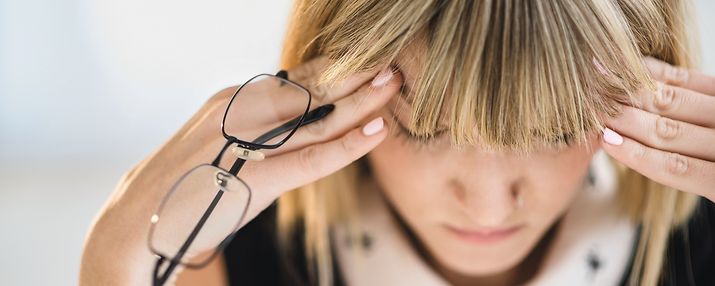Headaches - how can I help myself feel better?
An understanding of how your body reacts in certain situations, when and how it experiences pain and what can be done to alleviate this is extremely important for managing headaches. Together with specific techniques, such as relaxation and physical exercises, a knowing look at the complaints helps to deal with and relieve them effectively.

Experts believe that those affected can, for the most part, treat the main types of headaches, e.g., migraines and tension headaches, themselves. Nevertheless, if you are in any doubt you should always consult a doctor.
Document the pain
Keep a pain diary in which you note down how often and what kind of headaches you experience. This can be an invaluable aid in determining what triggers the pain and what you can do to reduce the symptoms. A diary can help you to manage the pain more effectively. Moreover, this provides your doctor with important reference points for diagnosing your headache type and thus suggesting possible treatments.
In addition to the type of pain, e.g., dull, stabbing, hammering, also observe the duration and intensity. The frequency of the symptoms is also important, i.e., how often daily, weekly or monthly and how long are the intervals between attacks. Write down where the pain is located and, for example, if the pain is experienced on one or both sides, on the forehead, temples, back of the head or another specific area. The time and circumstances under which pain occurs are also of interest, e.g., in the morning, evening or at night, after getting little sleep or in stressful situations.
Adjust your day-to-day life
Once you have recognised certain factors that trigger your headaches, you can take active measures to prevent these. Just a few, simple changes to your daily routine can help alleviate your symptoms:
- Ensure a healthy sleep/wake cycle: Find out for yourself how much sleep you need and when. A regular sleep rhythm, which you should also observe at the weekend, can help to stabilise your biological clock.
- Avoid psychological stress: If you are often under pressure at work or in your private life, this makes you more susceptible to headaches. Whilst it might be easier said than done, don't put too much pressure on yourself and say no every now and then.
- Avoid sensory overloads: Excessive screen time, whether on a mobile, laptop or television, can also cause headaches. That's why you should use these media carefully and take regular breaks from them.
Exercise and diet
Take a proactive approach to your headaches. Studies have shown, for example, that regularly engaging in endurance sports can reduce both the intensity and frequency of headaches. Exercising in the great outdoors, e.g., jogging or walking, is particularly good here, swimming and cycling are great too.
Diet also has a role to play and can help to alleviate symptoms. Note whether and how you react to certain foodstuffs in order, if necessary, to opt for other foods. You should also try to eat at fixed times and make sure you drink plenty of fluids.
Learn relaxation techniques
You can practise relaxing. If you suffer from headaches and migraines, experts recommend in particular the easily learnt method of progressive muscle relaxation. With this technique, various muscle groups are tensed for around ten seconds and then relaxed again. This allows any tension that is unconsciously induced in everyday life to be specifically eliminated.
How to take pain killers correctly
Always discuss with your doctor about how to take pain killers. Medication that is intended for an acute pain attack must not be used on a long-term basis nor should excessive doses be taken. Excessive use can aggravate headaches and lead to chronic pain.
Medication or alternative treatments?
Medication-based treatments and alternative therapies are not mutually exclusive. In fact, the opposite is true: in addition to medication, experts explicitly recommend changing one's lifestyle. If your quality of life is significantly reduced by your headaches, methods such as pain management, stress management and specific relaxation techniques can aid treatment and alleviate discomfort.
More useful tips
Whilst it might not be easy at first to change daily habits, doing this could offer considerable benefits and help you to regain your quality of life. If you continue to suffer from severe pain despite making changes to your lifestyle, there are other approaches that could reduce your suffering. These include acupuncture, the biofeedback method for stress symptoms and cognitive behaviour therapy. Your doctor will be able to advise you on suitable treatments.
When to consult a doctor
You should always consult a doctor in the event of the following:
- You suffer almost daily from headaches.
- You suffer from headaches together with a fever.
- The medication you have used to date is no longer effective.
- You suffer from headaches together with other symptoms such as weeping eyes, distorted vision, and paralysis.
- Your headaches affect your mind, e.g., you experience short-term memory problems.
- During or after physical activity you begin to experience very severe headaches that radiate into the neck region.
